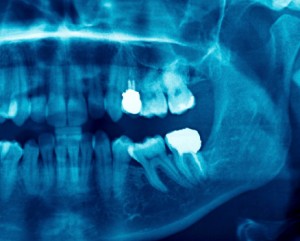Learn about the most common scenarios in which your dentist would order x-rays.
 If you’ve ever been to the dentist, no doubt you are familiar with dental x-rays. X-rays allow dentists a glimpse of what lies beneath the hard outer surface of teeth or underneath the gum line so he or she can devise the best possible treatment plan. Here are the 7 most common scenarios in which your dentist might order dental x-rays.
If you’ve ever been to the dentist, no doubt you are familiar with dental x-rays. X-rays allow dentists a glimpse of what lies beneath the hard outer surface of teeth or underneath the gum line so he or she can devise the best possible treatment plan. Here are the 7 most common scenarios in which your dentist might order dental x-rays.
Routine Care: At California Dental Group, we are strong believers in the importance of preventative dental care. In other words, we want to fix small issues before they have the chance to cause you major pain and discomfort whenever possible. Routine x-rays are an important part of this goal, because they can reveal developing problems like cavities between teeth, tumors, abscesses, and developmental abnormalities before they become painful. For adults, we typically recommend a full set of x-rays every 3 to 5 years, plus bite-wing x-rays once a year.
Diagnosing Pain: While in some cases the cause of a toothache or other type of dental pain is obvious, in other cases we may need to order x-rays to make or to clarify the diagnosis and develop an appropriate treatment plan.
Orthodontics: Having a full set of recent x-rays is essential to an orthodontist’s work. After all, they need to be able to see the positions of the roots of the teeth in order to determine what series of tooth movements will be needed to move teeth into their desired positions.
Root Canal: If the dentist does not locate all the roots of the tooth and determine the exact length of these roots, the root canal treatment may fail. X-rays help prevent this by giving the dentist a complete and accurate picture of the roots of the tooth getting the root canal.
Implants: Dental implants must be placed into healthy bone tissue in order to succeed. X-rays are used to evaluate the amount of available bone tissue and check for other factors that will determine if the patient is a good candidate for dental implants.
Wisdom Tooth Extraction: Prior to any extraction, x-rays typically need to be taken to identify any possible complicating factors, such as whether the roots of the tooth may be running close to a nerve. X-rays are especially important for cases of impacted wisdom teeth that have not yet erupted through the gums.
Crown or Bridge Work: If a crown or crown-supported bridge is to succeed, the tooth or teeth that will be receiving the crowns must be healthy. X-rays can be used to check for decay on these teeth as well as other problems that could affect the viability of the crowns.

